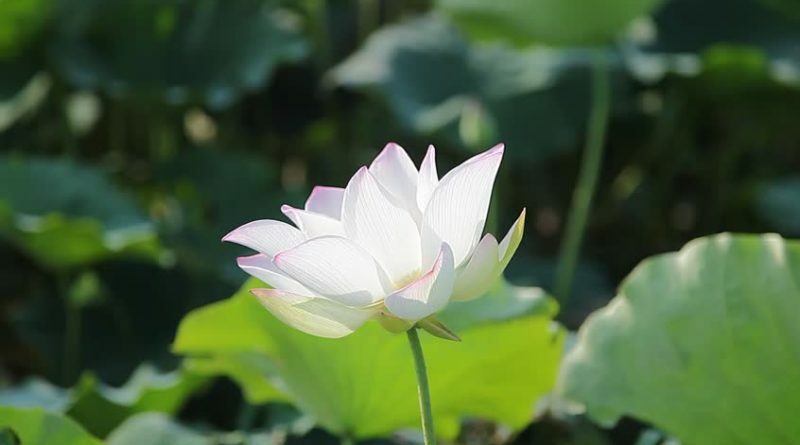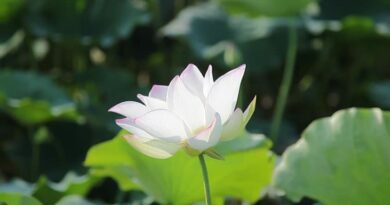COMPARING MIND
Comparing Mind
A couple of years back, I came across a photography book in which the photographer presented pictures of many scenes, with two different pictures of each scene. The larger was the one that he preferred. The second one was paired with it to give a sense of what was better about the larger one.
Seeing the two photographs right next to each other was very educational, because you could see that, yes, the larger one was better—not because it was larger but for a lot of other reasons: the composition, the color palette, the point of view.
It was a good book for training your eye, whether you’re planning to become a photographer yourself or just wanting to learn how to appreciate photography. It’s good to have your eye trained that way, having something to compare so that you can see, “Yes, this is different from that, this is better than that.” And you begin to understand why.
It’s the same with meditation. We’re here comparing mind-states. We’re trying to get the mind into a better state than it normally would be in if it were just left to its own devices. And to get a sense of what’s more skillful and what’s less skillful, it’s good to have comparisons.
This is one of the reasons why you have to meditate so much: so that you can begin to have a range of comparisons as to what kind of concentration is skillful concentration, what kind of concentration is a little foggy; when you’re putting too much pressure on it, when you’re not putting enough. You need things to compare. And this is a skillful use of the comparing mind.
The Buddha calls this “analysis of qualities.” It’s one of the factors for awakening. He defines it very simply as making the distinction between what’s skillful and what’s not. And, of course, “skillful” has many levels.
Luang Pu Dune made a similar comment one time, saying that, with regard to developing insight, “Once the mind gets still, you start comparing things.” He said, “Things that are dark, things that are bright”—meaning, of course, dark and bright states of mind.
You compare the results of what you’re doing so that you can gain a sense of what’s skillful, what’s not. Then you have to connect the results to what you’re doing so that you can gain a sense of how to change what you’re doing if it’s not coming out the way you want it, or if there are better ways of doing it.
This willingness to ask these questions is what keeps your meditation alive. Otherwise, you start drifting off, getting kind of drowsy, trying to force the mind to stay with one thing, and as it stays with one thing it begins to get dull—because the mind is used to jumping around: liking this, liking that, then deciding it doesn’t like this, running over there to something else. And it gets entertained as it jumps around.
But here we’re asking you to stay still. Still but alert. And one of the best ways of staying alert is to ask questions. Start with simple things like, “What kind of breath does the body need now?” And breathe that way for a while. Then change it, breathe in another way, and then compare.
If you’re not sure about the results of your comparison, well, try something else. Breathe in a different way, and then a different way, until you finally gain a sense that the breath has this kind of influence on the mind, this kind of influence on the body. That way, you can start learning how to read what the body and the mind need.
It’s not the case that there’s one ideal breath for concentration. Sometimes, when the body is tired, it needs an energizing breath. When it’s tense, it needs one that’s more relaxing. When you’re carrying some issues in from the day, sometimes you have to do some work first, some active contemplation, to get the mind ready to stay with the breath. That’s something you’ve got to learn how to read, too.
So to read, you have to compare. All too often we hear that you shouldn’t make use of the comparing mind in your meditation. If you’re just on meditation retreat for a weekend or so, that might be good advice. Otherwise, if you’re trying to force the results of your short time on retreat, you get all tied up in knots.
But when you think of meditation as a lifelong activity, which it is, you’re working on developing the mind. You’re aiming at results. And the mind is always going to need developing in one direction or another until you reach full awakening. There’s always more work to be done. And the more work you do, the more good work you do, the more you benefit.
So if you think of this as a lifelong activity, you’ve got to learn how to compare. Otherwise, the meditation doesn’t become a skill. It’s just a random shot in the dark. You shoot up in the air, and maybe once in a while you hit something, but there’s no skill, there’s no system to it, there’s no science to it. It’s all very random.
You don’t want your meditation to be random. Certain causes lead to certain results, and a large part of discernment lies in seeing the connection between causes and results—and having a sense of which ones are better. As you learn to ask yourself these questions, it gets you out of the dullness of a concentration that’s just sitting there getting drowsier and duller and drowsier and duller.
You have to take an interest in what’s going on in your mind. Part of this, of course, requires learning how to figure out when’s a good time to ask questions and when to just stick with one object without too much thinking. That’s something you’ve got to learn how to read, too.
If you ask too many questions, you get pulled away. There’s a right time for questions, and there are right and wrong questions. And a number one question to avoid is, “Is my meditation better than somebody else’s? Or is it worse than somebody else’s? Or am I a better person than somebody else?” That kind of comparing mind is to be put aside.
If you want to learn from other people, then it’s okay to ask if someone else is doing something better than you are, for the purpose of trying to adopt their skill and make it your own. But if you simply want to compare just for the sake of comparison, remember how arbitrary that kind of measurement can be. “Better” can be measured in many different ways. Sometimes we get good at a particular skill and other people are not quite as good in the technical side of the skill, and there’s some pride that comes around that. But then other people may be bringing a better attitude to their skill—in which case, you’re worse than they are.
So if you find yourself comparing yourself with other people, try to focus in on the actions that you can learn from. And even then you have to learn how to look all around.
Ajaan Maha Boowa talks about the pride he developed over the fact that he was able to observe the dhutanga practices better than any of the other monks staying with Ajaan Mun. But Ajaan Mun would every now and then do a little something to get in the way of Ajaan Maha Boowa’s dhutanga practice just to show him that it’s not all about the ability to stick to the rules. There’s a quality of the heart, a quality of the attitude, the pride, that you’ve got to watch out for, too. Being really good is something that’s all-around.
And because we tend to side with ourselves, we have to be very careful about this: how we measure what’s skillful and what’s not. We have to learn how to use our comparing mind skillfully if we’re going to get some benefit out of it.
Again, this is one of the reasons why people have warned about comparing mind. But just telling yourself, “Well, don’t compare,” doesn’t allow you to learn anything. You have to learn how to compare different ways of comparing to see which ones are more useful, more skillful, which ones get more well-rounded results.
So look at your actions and see if you can look at them again, from many different angles, to see what’s lacking. Sometimes, say, with the meditation, you may be doing the technique okay but something else is lacking: either the ability to ask the right questions or just having a sense of what’s better than what. What kind of mind-state is really useful for the practice, what kind of mind-states actually get in the way? Even though they may seem nice on the surface, you’ve got to live with these things for a while to really read them.
So the ability to develop a skill, to develop some maturity in your comparing mind: that’s what helps develop the meditation as a genuine skill, an all-around skill—something that changes not only the state of your mind but also changes the state of your heart. Because, after all, we’re training the whole heart and the whole mind, not just part of it.
This means that your powers of judgment should learn how to be all-around, looking at things from many angles. That way, the meditation becomes more than just a skill. It can lead to a real revolution inside.



